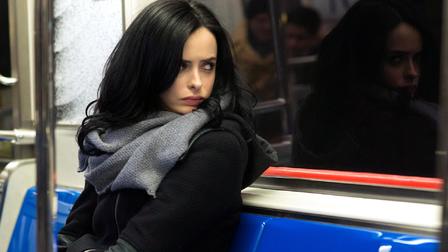Miss Jones
by wjw on April 5, 2018
 I’ve finished watching Season Two of Jessica Jones, wherein it was demonstrated that our alcoholic, PTSD-afflicted, short-fused trainwreck of a heroine is by far the sanest person in her family.
I’ve finished watching Season Two of Jessica Jones, wherein it was demonstrated that our alcoholic, PTSD-afflicted, short-fused trainwreck of a heroine is by far the sanest person in her family.
I mean, wow. Turn the cray-cray up to 11.
The first season had David Tennant as Kilgrave, the creepy stalker who is, basically, the obsessed character seen in a lot of genre romance, except that in romance he’s seen for some damn reason as a good guy. Kilgrave is that character as he would exist in the real world, except that he’s got invincible mind control powers and is a rapist.
I thought Season One dragged on too long, particularly once Kilgrave was revealed to be the villain. Then the rest of the season became a long vamping stall to delay the inevitable confrontation between Jones and Kilgrave, which you not only knew was going to happen, but also knew how it was going to play out.
Season Two is less direct and earns its length by keeping the audience guessing. It’s not clear who the villain is until fairly late in the series, and by then the villain doesn’t seem quite so villainous. The bad people aren’t evil incarnate, like Kilgrave, they’re just seriously fucked up, and a danger both to themselves and others.
Jones’ family moves a lot closer to the center off the action (you didn’t see all of them in Season One) and they’re all demented and obsessed in less-than-endearing ways. Jones has to exert a lot of effort to save them from their own folly, with mixed results. For that matter the entire population of NYC seems to be working through major trauma— which shouldn’t be that surprising, given how the Chitauri redecorated the Apple in the first Avengers film.
I flat didn’t believe the climax of the series, the scene that took place on the ferris wheel. (No spoilers here) That scene tacked too strongly against established characters, and tried too hard to be shocking.
But hey, up till that point it had my attention.
(And also, I couldn’t help but notice that this feminist super series written by and directed by women showed a surprising amount of skin. There’s a bit of beefcake, too, for those who like such things.)
 I’ve finished watching Season Two of Jessica Jones, wherein it was demonstrated that our alcoholic, PTSD-afflicted, short-fused trainwreck of a heroine is by far the sanest person in her family.
I’ve finished watching Season Two of Jessica Jones, wherein it was demonstrated that our alcoholic, PTSD-afflicted, short-fused trainwreck of a heroine is by far the sanest person in her family.
The common theme to this season was people doing terrible, wrongheaded things for the best of reasons. Even Trish, although in her case her supposedly altruistic tendencies are mixed with heavy doses of envy and self-importance. I really liked it. Superhero shows tend to be low on ambiguity, so not having a mustache-twirling baddie was a real breath of fresh air. It was also nice to see a story where you don’t have the eventual bout of fisticuffs as a climax.
As for the Ferris Wheel scene, and much of what came before, it was obvious the showrunners are pushing the pieces on the board so they can promote a pawn to a queen in season 3, and yes, it didn’t feel like that part of the plot evolved naturally. But it had to be done, I guess. I t was hinted back in season one.
I really, really liked and admired season 2, much more than the first one.
Along with this, I don’t like superhero comic movies and tv, and didn’t even know JJ (or Luke Cage, for that matter) were comic superheroes. So that I like this a lot says a lot about the creators. Not to mention Ritter — her JJ is an all-time favorite character for me.
Funny though — I don’t remember skin at all, other than JJ standing there in her underwear, vacillating on burning The Jacket.
Comments on this entry are closed.